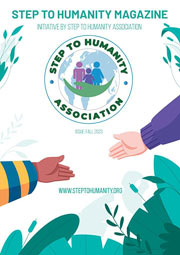Requirements not met
Your browser does not meet the minimum requirements of this website. Though you can continue browsing, some features may not be available to you.
Browser unsupported
Please note that our site has been optimized for a modern browser environment. You are using »an unsupported or outdated software«. We recommend that you perform a free upgrade to any of the following alternatives:
Using a browser that does not meet the minimum requirements for this site will likely cause portions of the site not to function properly.
Your browser either has JavaScript turned off or does not support JavaScript.
If you are unsure how to enable JavaScript in your browser, please visit wikiHow's »How to Turn on Javascript in Internet Browsers«.
International News
Aid boat readied as Gaza fighting rages before Ramadan
- Details

GAZA STRIP, Palestinian Territories, March 10, 2024 (BSS/AFP) - A boat laden with food for Palestinians in war-ravaged Gaza was "ready" to set sail from Cyprus, an NGO said, as fighting raged between Israeli troops and Hamas militants ahead of Ramadan.
The sea route aims to counter aid access restrictions, which humanitarians and foreign governments have blamed on Israel, more than five months into the war which has left Gaza's 2.4 million people struggling to survive.
Hopes were fading fast for a pause in the fighting before Ramadan, which could begin as early as Sunday depending on the lunar calendar, as Israel accused Hamas of seeking to "inflame" the region during the Muslim fasting month.
US President Joe Biden said Israeli leader Benjamin Netanyahu's approach to the war was "hurting Israel more than helping Israel", during an interview with MSNBC broadcast Saturday.
Netanyahu "has a right to defend Israel, a right to continue to pursue Hamas," Biden said, but added that "he must pay more attention to the innocent lives being lost as a consequence of the actions taken".
The United Nations has repeatedly warned of looming famine, particularly in north Gaza where no overland border crossings are open.
In Rafah, in Gaza's far south, "we can barely get water," said displaced Palestinian woman Nasreen Abu Yussef.
Roughly 1.5 million Palestinians have sought refuge in the city, where Atallah al-Satel said he wanted an end to the war.
"We are just exhausted citizens," said Satel, who had fled to Rafah from Khan Yunis.
Spanish charity Open Arms said its boat, which docked three weeks ago in Cyprus's Larnaca port, was "ready" to embark but awaits final authorisation.
It would be the first shipment along a maritime corridor from Cyprus -- the closest European Union country to Gaza -- that the EU Commission hopes will open on Sunday.
Open Arms spokeswoman Laura Lanuza told AFP that Israeli authorities were inspecting the cargo of "200 tonnes of basic foodstuffs, rice and flour, cans of tuna".
US charity World Central Kitchen, which has partnered with Open Arms, has teams in the besieged Gaza Strip who were "constructing a dock" to unload the shipment, Lanuza said.
Meanwhile, the US Central Command said a US Army ship left Joint Base Langley-Eustis in Virginia on Saturday carrying the "first equipment to establish a temporary pier" to receive aid off Gaza.
The Pentagon said Friday it would take up to 60 days to set up the temporary pier, which Biden announced the previous night.
With ground access limited, countries have also turned to airdropping aid, although a parachute malfunction turned one delivery deadly on Friday.
- 'Only part of the solution' -
The health ministry in Hamas-run Gaza said Saturday the number of deaths in Israel's bombardment and ground offensive in Gaza had risen to 30,960, including 82 people killed in strikes over the previous day.
At least 23 children had died from malnutrition and dehydration, according to the ministry.
Israel's campaign to destroy Hamas began after the movement's October 7 attack on Israel resulted in about 1,160 deaths, mostly civilians, according to Israeli official figures.
The Israeli army said another of its soldiers had died in Gaza, taking its overall losses to 248 since the start of ground operations.
The UN's World Food Programme has warned that the volume of aid that can be delivered by sea will do little if anything to stave off famine in Gaza.
European Commission chief Ursula von der Leyen, in Larnaca on Friday, said a "pilot operation" would be launched in partnership with World Central Kitchen, supported by aid from the United Arab Emirates.
The US effort for a "temporary pier" off Gaza builds upon the maritime corridor proposed by Cyprus, senior US officials said.
Humanitarian workers and UN officials say easing the entry of trucks to Gaza would be more effective than aid airdrops or maritime shipments.
The US military said it airdropped more than 41,000 meals into Gaza on Saturday, and Canada has said it too will join aerial aid delivery missions.
But a steady flow of relief into Gaza was "only part of the solution", said International Committee of the Red Cross chief Mirjana Spoljaric.
The warring sides must do more to "safeguard civilian life and human dignity", she said, decrying the "unacceptable" civilian death toll.
- 'Tough' truce talks -
In their October attack, Gaza militants took about 250 Israeli and foreign hostages, some of whom were released during a week-long truce in November. Israel believes 99 hostages remain alive in Gaza and that 31 have died.
After a week of talks with mediators in Cairo failed to produce a breakthrough, Hamas's armed wing said it would not agree to a hostage-prisoner exchange unless Israeli forces withdraw.
Israel has rejected such a demand.
On Saturday, Netanyahu's office said Mossad spy agency chief David Barnea had met CIA director William Burns on Friday "as part of the ceaseless efforts to advance another hostage release deal".
Biden has acknowledged it would now be "tough" to secure a new truce deal in time for Ramadan.
Saturday's Israeli statement accused Hamas of "entrenching its positions like someone who is not interested in a deal and is striving to inflame the region during Ramadan".
Israeli military spokesman Daniel Hagari said Israel was preparing for "all possible operational scenarios" during the Muslim holy month.
On the ground in southern Gaza, the Israeli army said fighting persisted in the area of Khan Yunis. Hamas authorities reported Saturday more than 30 air strikes overnight.
Hamas chief Ismail Haniyeh called for the speedy distribution of aid to Gazans and for the full opening of border crossings "to end the siege of our people".
The war's effects have been felt across the region, including off Yemen, where the US military said it and allied forces shot down 28 one-way attack drones fired by Iran-backed Huthi rebels towards the Red Sea and Gulf of Aden on Saturday.
Experts Gather Virtually to Tackle Plastic Crisis and Media's Role in Bangladesh
- Details

In a concerted effort to address the pressing environmental challenges posed by plastic pollution, a virtual meeting titled "Navigating the Plastic Crisis: Uncovering Risks and the Role of Media in Bangladesh" was recently convened. Organized by the North American Journalists Network and Step to Humanity Bangladesh, the seminar aimed to shed light on the urgent need to transform the Bangladeshi economy to mitigate the existential threats stemming from widespread plastic pollution. Presided over by Freedom Fighter Delwar Jahid, President of the Bangladesh North American Journalist Network and Executive Director of the Step to Humanity Association of Canada, the event brought together a distinguished group of environmental scientists and experts. These experts delved into the scientific aspects of plastic pollution and its chain hazards, providing critical insights into its profound impact on marine and terrestrial ecosystems, human health, and climate. Esteemed figures such as Dr. Mohammad Alam, Dr. Mohammed Mahbub Iqbal, Dr. Muhammad Anamul Kabir, and Dr. Mohammad Abu Jafor Bapary from Sylhet Agricultural University led the discussion. They presented compelling evidence of the exponential growth of plastic production and its detrimental effects on the environment. They highlighted the alarming rise in greenhouse gas emissions attributed to the plastics industry, projecting significant implications for global emissions by 2040 if current trends persist. Dr. Alam, in his address at the seminar, emphasized the pervasive threat of plastic pollution, shedding light on the alarming presence of microplastics and nanoplastics in both the environment and the human body. Recent research has underscored the detrimental impact of plastic pollution on human health, particularly its association with heart disease. Dr. Mohammed Mahbub Iqbal further explored the intricate cycle of plastic waste contamination. He emphasized the staggering presence of plastic litter in marine environments and stressed the urgent need for effective waste management strategies to mitigate further environmental degradation and health risks associated with plastic-contaminated food consumption.
During a seminar focused on plastic pollution, Dr. Abu Jafar highlighted the pervasive nature of the issue, emphasizing the concerning presence of microplastics and nanoplastics in both the environment and human bodies. These minute plastic particles have been linked to various adverse health effects, with a growing concern regarding their association with heart disease. It's evident that without decisive action, the situation will only deteriorate. Nasima Akter stressed the urgent need for coordinated efforts to combat plastic pollution, particularly protecting vulnerable populations such as women and children. She underscored the importance of implementing training programs at the local government level and raising awareness to mitigate the risks associated with plastic contamination. Dr. Kamrul drew attention to the shifting societal norms and lifestyles that have fueled the escalation of plastic waste. He highlighted the detrimental effects of apathy and lack of awareness regarding proper waste management, underscoring the need to explore practical solutions. Dr. Anwar emphasized the imperative of an integrated approach to addressing the complex challenges posed by plastic pollution. Recognizing the extensive scope of the issue, he asserted that piecemeal solutions are inadequate and that a comprehensive strategy is essential. Sajjad Hossain emphasized personal responsibility in combating plastic pollution, advocating for conscious choices to reduce reliance on plastic products. By raising awareness about our environment's vulnerability to plastic pollution, individuals can contribute to collective efforts to mitigate its detrimental effects. The seminar also underscored the pivotal role of the media in raising awareness and driving positive change in combating plastic pollution—journalists, including Feroz Miah, Shamsul Habib, Syfur Hasan, Md. Amzad Hossain and Kora Hasan Evana actively contributed to the dialogue, highlighting the crucial role of the media in fostering informed public discourse. In concluding remarks, Delwar Jahid emphasized the necessity for concerted efforts at all levels of society to address the plastic crisis effectively. He extended gratitude to all participants for their invaluable contributions and urged collective action towards building a more sustainable and resilient world, free from the threats of plastic pollution. The seminar catalyzed collaborative action, inspiring individuals and organizations to work towards a future where plastic pollution no longer threatens our planet and its inhabitants. With a shared commitment to transformative change, we can pave the way for a healthier, more sustainable future for generations to come.
Empowering Women in Bangladesh: Step to Humanity Takes Strides in Goat and Animal Husbandry, Small Business, and Agriculture
- Details

Step to Humanity Association, a distinguished international charity registered in Canada, is leading the charge in empowering women in Bangladesh to contribute to developing a progressive nation. The association, dedicated to sustainable organization and robust advocacy that catalyzes women's empowerment, recently hosted a virtual discussion on women's empowerment and self-determination rights in Bangladesh.
Chaired by Delwar Jahid, the executive director of the association, and featuring Ekramul Azim, a Canadian expatriate scientist, as the main speaker, the event shed light on key developmental issues in Bangladesh. Notable guests included Moazzem Hossain, Step to Humanity Association secretary and agriculturist; Dr. Kamrul Hasan, Step to Humanity Bangladesh president; Dr. Anwar Zahid, former director of Bangladesh Rural Development Academy; and Nasima Akhtar, a women development expert.
Agriculturist Moazzem Hossain, a guest of honor, underscored the organization's commitment to international charity work, explicitly targeting poverty-stricken regions such as Nigeria, India, Pakistan, and Bangladesh. Dr. Ekramul Azim outlined the association's initiatives to combat poverty, improve livelihoods, and enhance self-sufficiency, emphasizing alignment with the five-year strategic plan.
The virtual gathering also saw the participation of dignitaries such as journalist Khairul Ahsan Manik, Dainik Bhorer Suryaday editor Feroz Mia, and other prominent journalists and IT support experts. Various aspects of the association's projects, sociological analyses, and sustainable development strategies were discussed during the session.
Dr. Ekramul Azim shared success stories in goat rearing, showcasing women's significant strides in this traditionally male-dominated sector. He highlighted the importance of association-supported schemes and training programs to empower women in goat rearing.
Dr. Kamrul Hasan conducted a sociological analysis of the association's projects, aligning them with Bangabandhu's vision of self-reliant village development. Dr. Anwar Zahid discussed the challenges and limitations of undertaking projects without sustainable organization and suggested effective ways to overcome them.
Recognizing Bangladesh's progress, women's development expert Nasima Akhtar acknowledged Prime Minister Sheikh Hasina's efforts to recognize and strengthen women's rights to control wealth. Despite positive legal developments, challenges persist rooted in social and cultural norms, hindering the full realization of women's rights to control resources.
Delwar Jahid emphasized the continuous need to remove social and cultural barriers. She highlighted ongoing initiatives and awareness campaigns aimed at promoting a more equitable distribution of wealth, ultimately increasing the economic independence of women in Bangladesh to foster not only gender equality but also a smarter and more inclusive society.
Transforming Lives in Bangladesh: Step to Humanity Association's Pioneering Efforts in Climate-Resilient Development
- Details

Transforming Lives in Bangladesh: Step to Humanity Association's Pioneering Efforts in Climate-Resilient Development//Delwar Jahid //Bangladesh's coastal regions grapple with the profound challenges of climate change, from rising sea levels and cyclones to saltwater intrusion. Recognizing the urgency of these issues, the Step to Humanity Association, a Canadian charity, is dedicated to implementing innovative programs that aim to reduce poverty and enhance the resilience of communities in Asia and Africa. This article delves into the diverse initiatives undertaken by Step to Humanity and proposes novel ideas to address the specific vulnerabilities to climate change in Bangladesh's coastal areas.Women's Empowerment and Goat Rearing: The Sustainable Goat Rearing and Breeding Project in Bangladesh is a testament to Step to Humanity's commitment to empowering women and breaking the cycle of poverty. Launched in early 2022, this project distributed 100 Black Bengal Female Goats to 100 women, providing sustainable livelihood opportunities and fostering economic independence.Youth Employment Programs: Recognizing the importance of empowering the youth for sustainable community development, Step to Humanity proposes introducing vocational training programs tailored to the coastal regions. These programs would focus on skills such as sustainable agriculture, fishery management, and climate-resilient construction techniques.Education Support: Breaking the cycle of poverty requires enhancing education. Step to Humanity envisions collaborating with local educational institutions to establish climate change education programs, educating students and communities about sustainable practices, environmental conservation, and disaster preparedness.Health and Sanitation: Acknowledging climate change's profound impact on coastal communities' health, Step to Humanity seeks to expand its existing health initiatives. This includes medical camps and tubewell installations, with added emphasis on awareness campaigns addressing waterborne diseases exacerbated by climate change. Innovative, eco-friendly sanitation solutions are also on the agenda to improve public health.Treatment Project: Step to Humanity's commitment to healthcare access is exemplified by its Treatment Project, which aims to alleviate the financial burden on marginalized individuals in developing nations. By providing financial assistance for treatment costs, the organization strives to bring hope and strength to those facing the intersection of poverty and illness.Clean Water Access: Step to Humanity continues to make a substantial difference through its tubewell installation project, ensuring a reliable supply of pure water to communities in need. Livelihood Improvement: For climate-resilient livelihoods in vulnerable areas, Step to Humanity explores sustainable aquaculture practices, promotes salt-tolerant crops, and introduces alternative income-generating activities less susceptible to climate-related disruptions.Emergency Relief Efforts: Step to Humanity is enhancing its emergency response initiatives in response to the heightened frequency of climate-related emergencies. This includes pre-positioning relief supplies, conducting regular drills for community members, and investing in early warning systems to mitigate the impact of natural disasters.Climate Change Adaptation: Collaborating with local experts and organizations, Step to Humanity is developing climate change adaptation strategies. This involves implementing eco-friendly infrastructure, such as mangrove restoration projects, as natural barriers against storm surges.Livelihood of Disabled People: Ensuring inclusivity in all programs, Step to Humanity establishes special vocational training programs and support services designed to empower disabled individuals, enabling them to contribute to their communities despite the challenges they face actively.Conclusion: As Step to Humanity Association continues its mission to alleviate poverty and address critical issues in vulnerable communities, tailored programs addressing the unique challenges of coastal regions in Bangladesh are essential. By incorporating innovative ideas and collaborating with local stakeholders, Step to Humanity strives to make a lasting impact on the lives of those affected by climate change. Your support can contribute to the success of these initiatives, fostering positive change for generations to come.



















